Measures of Effective Teaching: Student Feedback Transcript
Paul Ronevich: I want you guys with your hands just show me how long a million years is?
Paul Ronevich: My name is Paul Ronevich. I am a sixth through eighth grade science teacher at Pittsburgh Science and Technology Academy.
Paul Ronevich: We’re going to condense all of my life into a meter stick.
Paul Ronevich: What I found here at this school that I love is a community of teachers that really value working with kids and pushing kid learning.
Paul Ronevich: How do we get oxygen in the air?
Student 1: Plants.
Paul Ronevich: And yes, I want you to write all of the zeros because that helps it-- oh, I know I’m cruel.
Dr. Robert Scherrer: What we focus on is a system that allows us as the administrative team, teachers among teachers to provide feedback to one another that allows everyone to grow their practice.
Paul Ronevich: But one more surprise, then we’re going to hopefully surprise you to today too.
Dr. Robert Scherrer: Because if we’re not continually getting better at what we do then we’re just spinning our wheels.
Paul Ronevich: Then we have?
Student 2: First dinosaurs.
Paul Ronevich: First dinosaur evolves. Non-avian dinosaurs go extinct. That’s such a sad story line.
Paul Ronevich: As a teacher there’s a bunch of different ways to look at my practice.
Paul Ronevich: Why do you think grass was so surprising and so late on the scene?
Paul Ronevich: One of those ways is my administrator, my principal coming in and observing my classroom.
Paul Ronevich: Every time you see a movie with dinosaurs they usually have grass in there.
Paul Ronevich: And they’ve added aspects, one of them is called VAM, which is value added measures, which it shows what your student growth is over time. And the last one is tripod which allows our kids to survey us.
Dr. Robert Scherrer: I’d like to take some time to go through your tripod results from this past school year.
Paul Ronevich: The tripod survey is feedback provided by your students that lets you get a good glimpse of what you’re doing well in your practice, and what you need to work on.
Dr. Robert Scherrer: I think that’s one thing that the adults typically don’t do a very good job in schools is really listening to the student experience through the student’s eyes.
Paul Ronevich: You guys are really, really close in your estimates, so good job reasoning that out.
Paul Ronevich: Students aren’t just people that show up every day that you give this information to. They’re participants in it and they understand that what you’re doing is to help their learning.
Paul Ronevich: I want you to think out loud as you do this so we can hear what you’re thinking?
Sabina: And they weigh a different amount. They weigh less than they all ready did.
Sabina: It’s interesting that they want to hear the students’ opinions.
Paul Ronevich: Which way should we move it?
Christopher: Somewhere around there.
Christopher: Well, the tripod survey to me is like how you feel about the teacher and how your learning environment is.
Paul Ronevich: Anybody else share yours or build upon that?
Gibran: A single cell organism came about and then it became multi cellular.
Gibran: We have the power to shape how we want to do it together.
Dr. Robert Scherrer: So what are some of the things you consider when planning your lessons that has students responding so favorably?
Paul Ronevich: What I do well with my kids is I let them build a lot of how our classroom runs.
Gibran: When water goes from solid to liquid it is called?
Student 3: Melting.
Gibran: Yeah.
Paul Ronevich: A lot of the homework that I give is them asking questions but then I build in next week lesson’s off of.
Paul Ronevich: What’s what?
Student 4: Non-avian.
Paul Ronevich: Remember, we talked about this, what’s Avian mean?
Student 4: I should know this. I forgot.
Student 5: Does that mean like flying?
Paul Ronevich: Flying. What types of dinosaurs fly that are still alive today?
Student 5: Birds.
Paul Ronevich: Birds. Remember birds are considered dinosaurs.
Paul Ronevich: It would definitely be daunting to consider these kids are in charge of your evaluation and I was definitely nervous opening my tripod results.
Maliyah: For most of us I think it’s more about our education so that he can find out what he actually needs to do better.
Chris: Is the teacher good at saying the stuff clearly? Because we’re trying to make the teacher better so the students can learn more.
Gibran: Every teacher can work on something.
Sabina: Every teacher has a flaw and so sometimes the teacher doesn’t notice about themselves.
Dr. Robert Scherrer: What are some of your takeaways from the student feedback around the consolidate C? Are they things that you are now doing differently because of the feedback that you’ve received?
Paul Ronevich: So consolidates is my worst one. A lot of times I get to the end of class, it’s interesting until the end of class then I put the homework up and the bell rings and then they go. I started after I saw these to develop this with my kids of how at the end of class we could make that more interesting for them.
Paul Ronevich: Remember question saved for tomorrow, summaries, connections, analogies, go ahead and share those.
Gibran: Human civilization is kind of like a baby.
Paul Ronevich: Okay. Say more about that.
Gibran: It was really close to now.
Paul Ronevich: I think a lot of you were surprised at how close that was to the end, right.
Christopher: I did notice a different kind of change or Mr. Ronevich.
Paul Ronevich: I want to hear at least three people’s summaries for homework. What did you write for your summary for homework?
Sabina: Before he didn’t really summarize what we learned at the end of class. But now pretty much every day he asks us to write in our notebooks a summary or a question or a connection. And then he asks at least two people to share what they wrote.
Paul Ronevich: And honestly without this I don’t think I would have ever been pushed to do that. But seeing that they see that, that we don’t have a way to wrap it all up at the end of class forced me to do this. And I’m really happy with how that works now and the kids seem to like it as well.
Paul Ronevich: What I like about the tripod it gives me very specific feedback and it lets me know the areas that the kids see I’m good at and that I’m not good at. And it also keeps me accountable.
Paul Ronevich: There was a lot of questions in there that made me stop and think. The one that made me think the most was student behavior in this class makes the teacher angry. And I think sometimes they realize I care about them but sometimes they just tick me off and I lose my temper. What that does is I realized is it makes me not their ally anymore. It makes an adversary. And I don’t want to be that.
Paul Ronevich: Everyone go ahead and back to your assigned seats. All right, back up front please in five, four, three, two, one. Okay. Let’s get a few people to share, what surprised you?
Paul Ronevich: Me keeping my cool a lot more this year has really helped.
Dr. Robert Scherrer: I try to never forget what it was like to be in the classroom myself.
Paul Ronevich: Where on this timeline is my birth? Where would you put that?
Dr. Robert Scherrer: And I see all of these multiple majors and I get excited because I know as a teacher I would have been incredibly excited to get that feedback and what can I do and how can I change and how can I become better at my craft?
Maliyah: To be a part of a process of our learning helps it better for us to be comfortable and learn easier. So I think it is an important thing that not just us science and math schools should do, but all schools should do.
Dr. Robert Scherrer: It’s not just about evaluation. It’s about professional growth.
Paul Ronevich: Maybe I’m good at what I do today but I can still get better.
Paul Ronevich: Where’s my facilitator? Did I miss any tables for homework? One more person with an analogy, a question or connection. All right, is every group ready? Does every group need more time?
#### End of MET_Pittsburgh_060313.mov ####
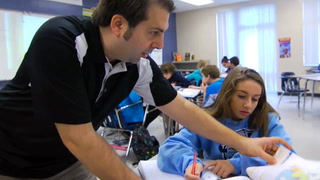
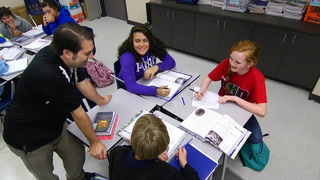
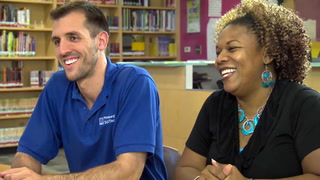
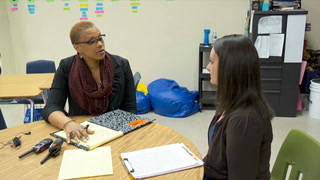
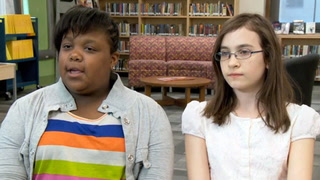








43 Comments
Phenice chatman Feb 24, 2021 3:11pm
This is an awesome video, this was being done, but not dictation of teaching to the test is becoming overwhelming to not only the students, but educators who have no control of what is most important for their group of kids.
Carol Esquibel Apr 11, 2020 11:11pm
I love this!! I think it is so important to know what the student thinks about us. They also must be allowed to voice their own ideas and strategies that might help the teacher to teach better. It is so important to form a community that can give feedback without feeling threatened by the teacher. I thought it was so amazing how this teacher handed feedback from his students. It is so powerful as an educator to be able to critiqued and observed. So as educators we can learn from our mistakes.
Kathry LaBlance Jun 23, 2018 10:28am
Linda Perez Mar 30, 2018 12:34am
Katherine Chapp Mar 25, 2018 4:34pm